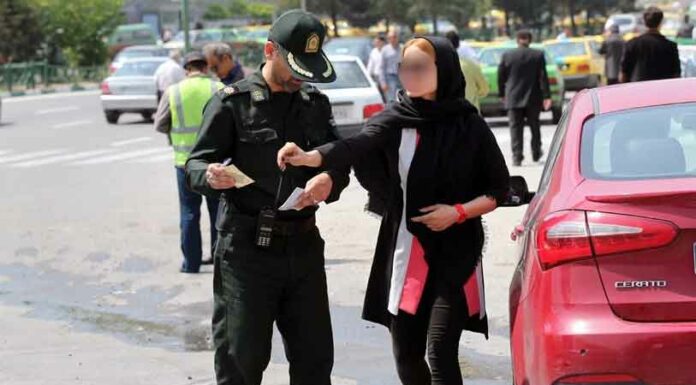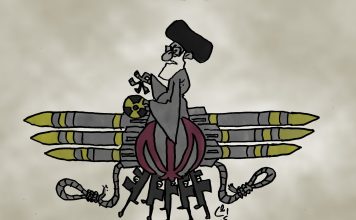On July 6, 2019, the head of Tehran’s “Prosecutor’s Office for Guidance,” Mohammad Mehdi Haji-Mohammadi, said his office had launched an official channel (@dadresa_ershad), available on various messaging platforms including Telegram, where “concerned citizens” could report any incidents involving “immoral behavior” and violations of the mandatory hijab.
In comments reported by the Tasnim news agency, Mr. Haj-Mohammadi said: “The measure provides a platform for concerned citizens to report any moral indiscretion and hijab violations.”
Mr. Mohammadi called on “concerned citizens in Greater Tehran” to be vigilant and report hijab violations, inappropriate behaviors in vehicles, and actions threatening the “sanctity of the family institution,” Tasnim reported. Haj-Mohammadi urged citizens to report any “immoral behavior,” including dancing, and serving and consuming alcohol in cars, restaurants, cafes, and other public places.
He called on the public to report incidents of “moral corruption” including parties and prostitution by calling the telephone number 09054309484 or sending texts to domestic messaging apps Bale, Soroush, Eitan, and others, Tasnim’s report added.
Soroush is owned by Islamic Republic of Iran Broadcasting (IRIB).
A year later, the deputy commander of the Law Enforcement Forces, Brigadier General Ghasem Rezaei, unveiled “Monitoring Plans 1 and 2” to crack down on hijab breaches in cars, shops and public venues.
Under the plans, “first-time offenders will receive a warning text on their mobile phones.” The Guidance Patrol (Morality Police) summons anyone who violates the mandatory hijab for the second time. They will be “required to sign a document, promising not to violate mandatory hijab.” Those breaking the law for the third time “will face legal proceedings.”
A typical text message sent by the Morality Police to “first-time offenders” reads: “Dear owner of the vehicle with registration (number) on (date) and (hour), a hijab violation was recorded. While urging everyone to avoid social indiscretions, we must remind you not to commit the same offense. The Judiciary and police will start legal proceedings against repeat offenders.”
[aesop_image img=”https://kayhanlife.com/wp-content/uploads/2022/07/payamak-hejab-4.jpg” panorama=”off” credit=” KL./” align=”center” lightbox=”on” captionsrc=”custom” captionposition=”left” revealfx=”off” overlay_revealfx=”off”]
A text message sent to a “second-time offender” reads: “Dear owner of the vehicle with registration (number) on (date) and (hour), a hijab violation was recorded. You must report to the nearest Morality Police station in your neighborhood in the next 10 days, given you ignored the previous warning and committed the same offense.”
[aesop_image img=”https://kayhanlife.com/wp-content/uploads/2022/07/payamak-hejab-2.jpg” panorama=”off” credit=”KL./” align=”center” lightbox=”on” captionsrc=”custom” captionposition=”left” revealfx=”off” overlay_revealfx=”off”]
The Islamic Republic has tried to restrict women’s rights and freedoms in the past 43 years. However, Iranian women have continued to defy draconian laws and have been fighting for their rights and freedom, despite the Islamic Republic’s best efforts to suppress them and treat them as second-class citizens.
Several people in Iran have spoken to Kayhan Life about the state’s efforts to crack down on “hijab violators” and slap them with heavy fines. The Guidance Patrol expands the scale and scope of its operation at the start of the hot season every year, enforcing the compulsory hijab and harassing girls and women in cars, streets, and public venues.
[aesop_image img=”https://kayhanlife.com/wp-content/uploads/2021/12/2021-12-14T000000Z_1318302636_MT1NURPHO000IUD9AI_RTRMADP_3_HEALTH-CORONAVIRUS-IRAN-scaled.jpg” panorama=”off” credit=” REUTERS./FILE PHOTO.” align=”center” lightbox=”on” captionsrc=”custom” caption=”Iranian young women walk along a street near a historical church in the city of Isfahan, 450 km (281 miles) south of Tehran.” captionposition=”left” revealfx=”off” overlay_revealfx=”off”]
Mehdi, a university student, living in the affluent Mehrshahr district of Karaj, 43 kilometers northwest of Tehran, told Kayhan Life: “Various organizations started a campaign in 2019, urging people to report hijab violations in cars and streets to authorities.”
“They [authorities] even established ‘judicial watch groups,’ giving them authority to confront anyone violating the mandatory hijab in streets and cars. These are plainclothes people who have been receiving many reports about hijab violations since then,” Mehdi explained.
He noted that there were many glitches in the technology used by the state to spy on people and intrude on their lives. For instance, a state TV presenter who wore a headscarf always received a text warning her not to violate the mandatory hijab again. Also, Shpejtim Arifi, a former striker for the premier league Persepolis Football Club, who lives in Iran, reportedly received a “hijab violation” warning in January.
Mehdi said the police had sent out several text messages, saying they were aware of the technical glitches in their system.
[aesop_image img=”https://kayhanlife.com/wp-content/uploads/2022/07/payamak-hejab-3.jpg” panorama=”off” credit=” KL./” align=”center” lightbox=”on” captionsrc=”custom” captionposition=”left” revealfx=”off” overlay_revealfx=”off”]
“After receiving a ‘hijab violation’ message last year, I went to a Morality Police station, showing them the text, and was told that the passenger in my car was not wearing hijab at 10 am that day. I explained to them that I was the driver and no one else was in the car. I also told them that I was at my mother’s house at the time the incident supposedly happened, but they impounded my car and fined me.”
Mehdi said receiving a text message is just the start of a long bureaucratic process.
“The first text is a warning. If it happens again, then the car’s owner must go to a Morality Police station and sign an affidavit, and after the third time, the owner must drive their car to the city pound, where it must remain between 15 to 20 days before it can be released,” Mehdi explained.
“Besides paying for the car pound, the car owner must also pay a fine of at least $7. After paying all the fines and fees to the city, they release the car,” Mehdi noted. “As a result, many girls and women adhere to the restrictive hijab code while driving their cars, because they do not want to have to pay a police fine and a fee to the city car pound.”
“It also becomes a family issue with fathers, husbands, and brothers pressuring the girls and women in the household to observe mandatory hijab because no one wants legal entanglement with the Morality Police, having to pay a fine and a fee to the city car pound,” Mehdi added. “They prefer not to let the girls and women in the family drive, constantly reminding them to wear proper hijab.”
“Contrary to the aggressive and confrontational tactics used by the Guidance Patrol, the Islamic Republic has used the texting app to achieve its goal of enforcing the mandatory hijab quietly,” Mehdi argued. “It is also a money-making scheme by the state. It generates revenue by fining car owners and their passengers and getting large fees for releasing cars from the city pound.”
Afshin, a retired office worker, who makes a living by driving for the Snapp car hire service, told Kayhan Life: “Many drivers, working for Snapp and other agencies, refuse to take women passengers who do not wear proper hijab, fearing they would receive a ‘hijab violation’ text. The situation has created heated public debate and arguments.”
Mojgan, an architect living on Tehran’s westside, spoke about people who exploited the app to report hijab violations for personal reasons.
“A close friend of mine was driving in a one-way street a few months ago. Suddenly, a car going in the wrong direction signaled my friend to pull to the side,” Mojgan explained. “But my friend had the right of way and did not pull to the side. The other car’s driver threatened my friend, saying she would receive a warning text later that night. My friend received a text message later that night, saying that an incident of hijab violation had occurred in her car, and she must report to the Morality Police.”
“Some people use it [mandatory hijab] as a power game in society. For instance, if someone does not like a woman or has been rejected by one, they may make sure she gets a [hijab violation] text message,” Mojgan said. “There is no way to monitor such behavior that violates people’s civil rights.”
Iran Arrests Four Female Vocalists; Women Face More and More Constraints
Mahnaz, a college professor banned from teaching, told Kayhan Life: “If a car owner ignores the text messages, or does not report to a Morality Police station, or does not surrender their car to the city pound, the police add the car to the list of those to be impounded, which means they can seize it any time.”
A text sent to “repeat offenders” reads: “Dear owner of the vehicle with registration (number) on (date) and (hour), this is to inform you that your car will be impounded, given that you have ignored all previous warnings by the Morality Police regarding hijab violations (repeating the same offense and failing to report to the police).”
“It is a stressful process,” Mahnaz added. “A person must go to court, get a letter proving they paid the fine, take the receipt to the motor vehicle department, and pay all city charges, using the government website. Also, they have to pay crane charges for removing the car from the city pound.”
According to Mahnaz, authorities also impound vehicles for other indiscretions besides hijab violations committed inside a car, including smoking cigarettes, wearing inappropriate clothes, “liaison,” traveling with a dog, playing loud music, contributing to noise pollution, and eating during the fasting month of Ramadan.
Iran Bans Screening Tests for Pregnant Women Under 35 With No Prior Abnormalities












